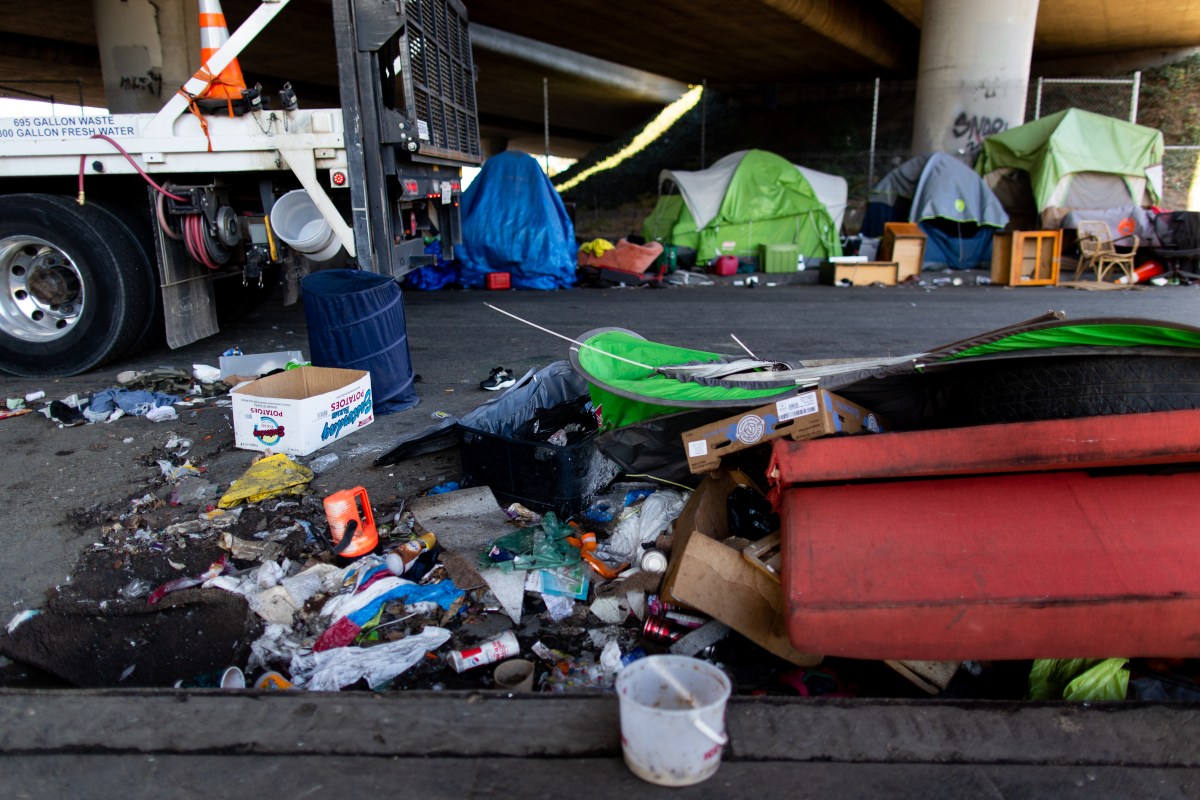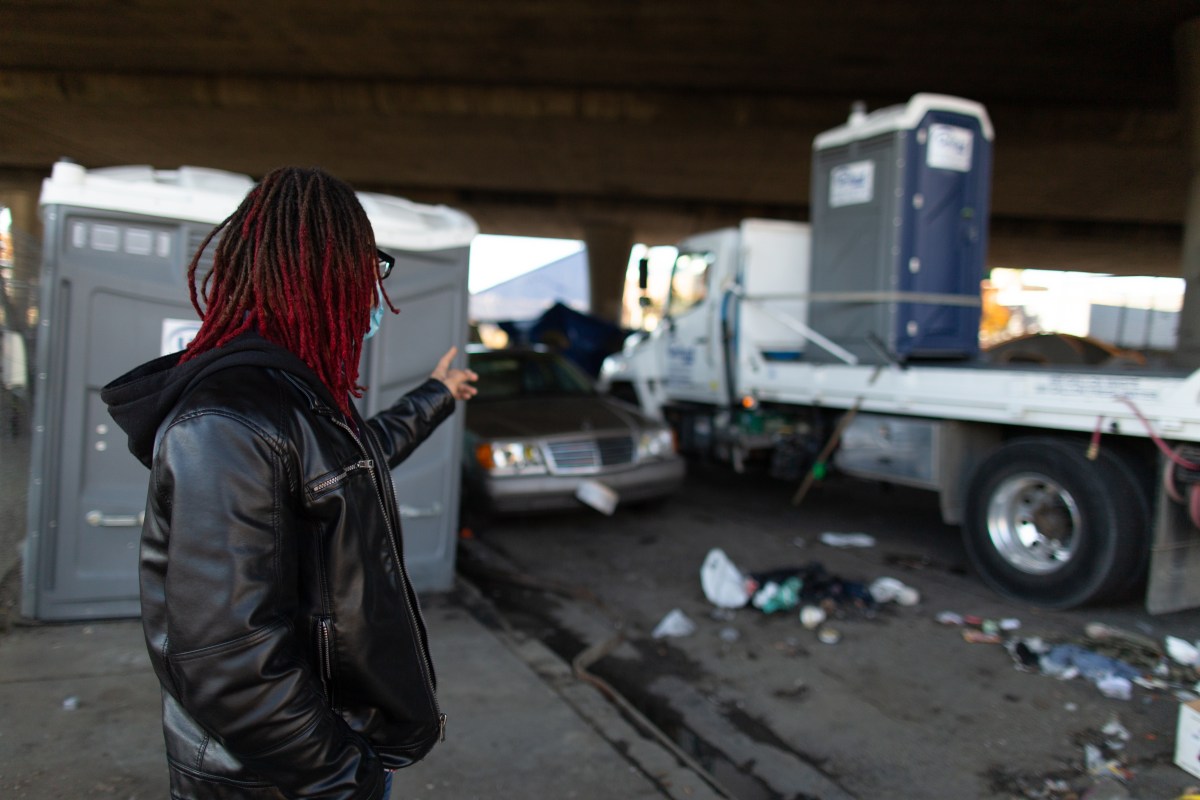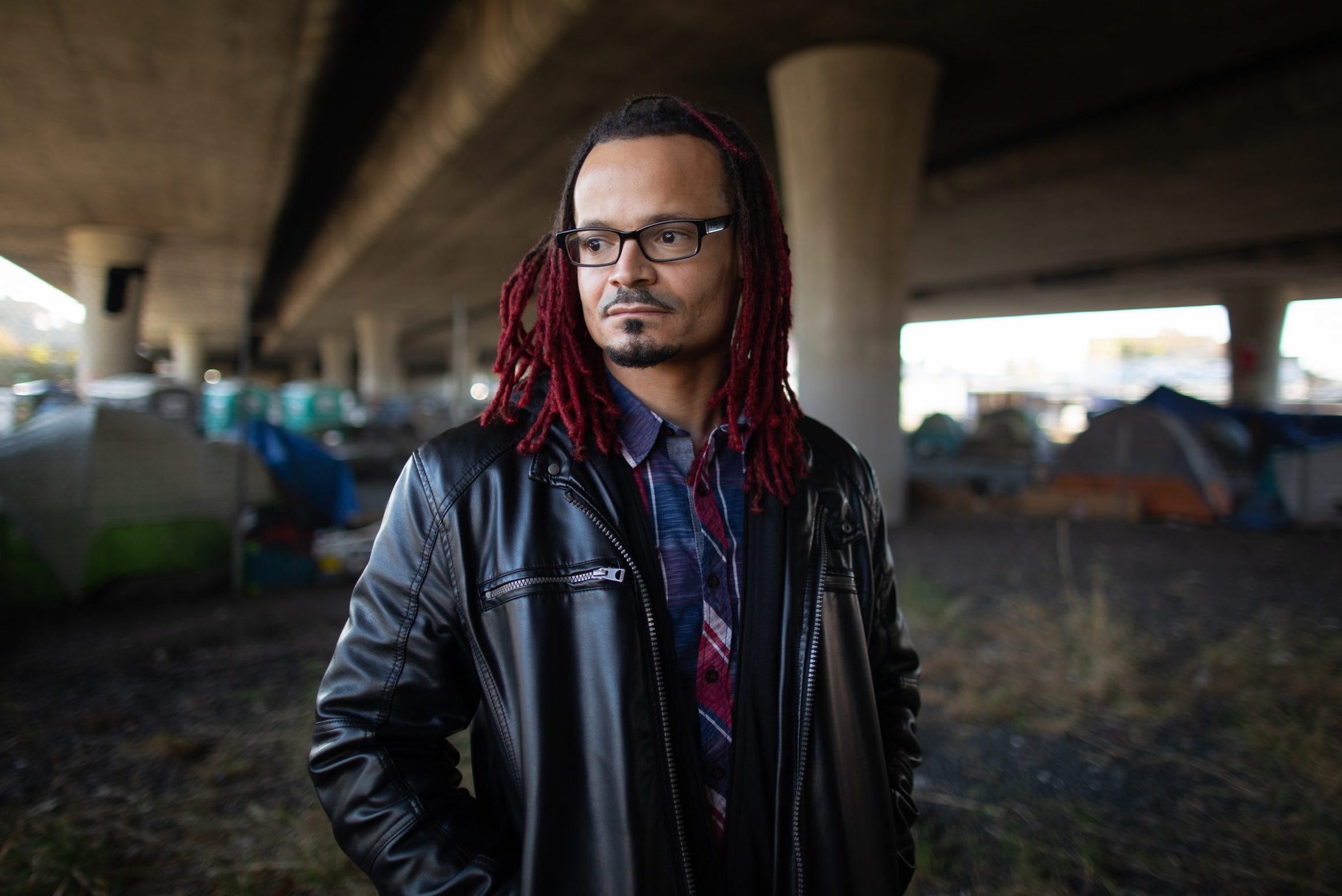
This story is part of Amplify Oakland, our series of first-person stories shared by Oaklanders in their own words. Read more.
“What are you doing?” asked the boy, his eyes gazing up at me.
“I’m working out to make sure I stay strong,” I said as I finished my reps at MLK Park in West Oakland. “Do you exercise?”
“No,” he said. “We live in that van.” He pointed at a nearby vehicle. “And mama won’t let me play in the park ‘cuz she said it’s too dirty.”
I looked around and noticed the amount of trash—broken glass, empty drug baggies, discarded condoms, needles. I looked again at this six-year-old child, and I saw myself. When I was his age, I’d lived right up the block from this very place. And years later, when I was struggling with addiction, I’d sheltered myself in the park to use drugs and to sleep, though I had a home not a hundred yards away.
Early the next day, a Saturday, I went to Home Depot and bought trash bags, a rake, a shovel, and a broom, and rented a leaf blower. Then I went back and cleaned the park, bagging every piece of trash I could see. I worked for 12 hours that Saturday, and 9 hours on Sunday, until the park was completely free of trash.
The problem of trash and illegal dumping in Oakland wasn’t always this big. Growing up in different parts of Oakland I saw trash—mostly broken glass and sometimes needles—but we weren’t as worried about it then, and the amounts were nothing like what I see now. These days, it seems everywhere I look there’s trash, so much careless dumping in our streets.
Part of the problem is the huge amount of garbage that’s being dumped in areas populated by unhoused people. Discarded household items like couches and dressers litter the streets and underpasses, and sometimes even block freeway offramps, posing a safety hazard. Rotting food gets left out for weeks. Stepping on broken glass or a used needle can be and is a traumatic experience. These things are a health risk to the housed and unhoused alike—but it’s unhoused people that have to live in it.

Having been homeless myself in the past, and having seen the dumping firsthand, I know that it isn’t all being created by unhoused communities. I also know that our unhoused communities don’t welcome it. People who aren’t unhoused may see the dumping and assume it must have been “the tent people”—a term that I’ve actually heard used in my presence. In reality, it’s often regular citizens who don’t schedule pick-ups with the city for one reason or another and dump their garbage and unwanted items in the places where unhoused people live.
After my conversation with the boy in MLK Park on that weekend back in August, I realized that I could no longer ignore the problem. I was nine years old the first time I experienced being unhoused, and I know what it feels like to be stigmatized. I’ve experienced people stepping over me on the street like I was trash. I felt firsthand the lack of compassion and human kindness. To believe that people somehow want or deserve to live in these conditions, and to continue to allow it, is wrong.

While I was deciding to take action to clean up my community, people in Oakland and across the nation were protesting, marching, and rioting. And everyone’s cry was the same: “Black Lives Matter!” For me, the expression of that was different. See, a majority of the unhoused in Oakland are Black. I battled with myself over how best to use my voice and decided that I wouldn’t speak, but act. At a time when so many of our people are afraid, hurt, and suffering because of the pandemic and the political climate of this country, I realized I could show that Black lives matter by acknowledging and engaging with my people who are unhoused while I cleaned. By learning their names, greeting them, asking them how they are doing, and showing them that, at least to me, their lives matter.
At the same time, I wanted to get the housed residents of some of these neighborhoods involved. By cleaning side-by-side with people who are unhoused, my hope was that maybe housed people could learn their stories, feel their energy, and be put more at ease, so that the next time they walked out their door and down the street, they’d have a different perspective on their unhoused neighbors.
I knew that I would have a difficult time getting people involved, with so many already apprehensive about leaving their homes because of COVID. I also knew that as a person of color in this society trying to do the right thing, I couldn’t necessarily count on enough help. So when I started out with the idea of organizing trash pickups, I thought it would just be me and a few of my close friends taking this on. I came up with a name for our group, Urban Park Cleanup, set up an email address, printed some business cards, and we moved forward with weekly weekend cleanups of dumping areas in and around West Oakland.



Vincent Ray Williams III cleaning debris and bagging trash in West Oakland. Credit: Courtesy Vincent Ray Williams III
Countless people walked by, stopped to ask us what we were doing, and said they were interested, but never got involved. But there have been some surprises.
resources:
To report illegal dumping in Oakland: (510) 615-5566
For a list of resources on how to legally dispose of your junk, click here.
To volunteer with Urban Park Cleanup, email: urbanparkcleanup@gmail.com. You can also follow and support the work on Instagram.
On one occasion in mid-October, while cleaning an encampment around 35th and Telegraph, a man rode by on a bike. I noticed him, but kept working. Then I saw that he’d stopped, and was watching me clean. So I went over to him and introduced myself. He asked what we were doing, and I told him about Urban Park Cleanup, and what our goal is. He took my information, and promised to be in contact. I went on with the cleaning, with no expectation.
To my surprise, I later received an email from a woman I had never met, named Lynne. She introduced herself as the wife of the man on the bike, expressed her gratitude for what I was doing, and said she would like to be supportive. Lynne made one of the first donations to Urban Park Cleanup, and we are still in contact regularly. Lynne believed in the work I was doing, and without knowing it, motivated and encouraged me to continue.
Other people were beginning to notice, from community members to the public works employees that were being dispatched regularly to clean up the heaps of trash bags and dumped household items that I was leaving on the curbs. More people started asking questions about how to get involved, and started volunteering. The project began to take off. I bought more equipment. I would pick a spot and we would clean it. I’ve mainly been focused on West Oakland because it’s an area that gets overlooked, but we cleared a spot off Seminary in East Oakland, too. I started posting on Instagram, and more people got involved. One woman drove all the way down from Sacramento to meet us at 8:30 a.m. to clean up, just because she wanted to be part of the solution.
We’ve spoken with the city’s public works office, and learned their schedules for pick up, and we make sure that the bags and piles we leave are in designated areas. We also encourage people to call and report illegal dumping around the city because we believe that the more people are fined, the fewer people will dump.
And we’ve moved beyond just picking up trash. We’re taking donations of tents, blankets, clothes, and other goods and dropping them off for the unhoused, in the hopes that when it’s rainy or windy they won’t need to rely on old hand-me-downs to keep them warm. About 20 volunteers are now involved. Usually four or five of us are out on any given day, but last weekend there were eight of us, and the amount of cleaning we were able to get done was extraordinary.
What a few people can do, in a few hours, once a week, is huge. Piles of trash are disposed of, and the benefits of cleaning these areas are more than can be listed. And the greatest pay off? After all the trash is bagged up, needles disposed of, and I am walking down the street surveying the finished product, I see joy in the eyes of the people in our community.
On the Monday after that first weekend cleanup in August, I went back to go exercise at MLK park and I noticed that little boy was out on the basketball court shooting hoops. When I got out of my car, his mother was parked behind me in their van. She came up to me and asked why I’d cleaned the park. I told her that it was because of the conversation I’d had with her son, and that he’d inspired me. She thanked me, and it was cool. It was validating, and powerful.

